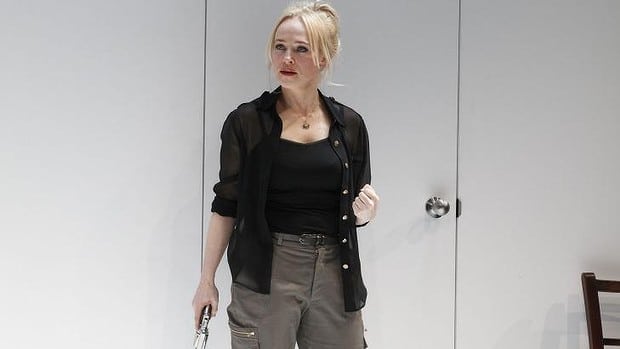MTC: Death and the Maiden
Ariel Dorfman wrote Death and the Maiden in 1990 on his return to Chile, after 17 years in exile, in the aftermath of Pinochet’s military dictatorship. The 1993 STC touring production is still talked about and the 1994 film is still a favourite, so why have the MTC chosen to tell it? Why this story? Why now?

With Australian politics tumbling into an abyss of secrecy and blame where those who speak out about inequity and abuse are punished and threatened, and those who are meant to oppose turn a blind eye or support, it’s a story to help us remember recent history and how governments and countries have broken themselves and their people as they’ve moved to the far right.
When lawyer Gerardo (Steve Mouzakis) is dropped at his isolated beach house by the stranger who helped him with a flat tyre (Eugene Gilfedder), his wife Paulina (Susie Porter) is convinced she recognises the man’s voice. She is certain he’s the doctor who blindfolded, raped and tortured her while playing Schubert’s String Quartet No. 14 in D minor, known as Death and the Maiden, when she was arrested and held as a political prisoner.
Combining psychological thriller with a reflection on and revelation of the horror of the Pinochet years, it’s about finding a place of balance between revenge, justice and understanding (if not forgiveness) that lets life go forward. Which is easy to talk about, but far harder to do when faced with the reality of PTSD and knowing that torturers are free and could be sitting next to you.
Australia’s federal government can’t be compared to a military dictatorship, but every day we are told that people being abused, and some have died, in our government’s care. If a political prisoner and a lawyer used their money and connections to flee their home and sought asylum in Australia today, what would happen to them? What is happening today to people like them? Now is the time to tell this story.
Director Leticia Cáceres (direct from the breathtaking season of Birdland) has taken the story even further out of its context of an unnamed South American country and set it in a place where the people sound like us. A revolve stage is lit from above (designed by Nick Schlieper) and has three identical white spaces furnished with a chair and a tape recorder. It’s part-stage-on-a-stage and part-24-hour-lit prison cell, and its white walls and emptiness allow for the audience to imagine the world they want, or need, to see.
This empty white can magnify the terror and confusion, but it also creates distance and magnifies what’s missing on the stage as there’s no where for the performers, or the text, to hide.
Doubt is missing. The driving force of this work is doubt. The sort of doubt that makes you change your mind every minute about who you believe and about everything that’s being told. This is a work that only rips you apart if you don’t know who, if anyone, is telling the truth. It’s a whirlpool of right, rights and wrong that asks endless questions about memory and justice and what we mean when we decide what is fair and just.
The doubt is in the text – I know the truth I want to see, but can’t convince myself that I’m right – but it isn’t driving every action on the stage. It’s not that I didn’t know who to believe, but that I didn’t believe any of them.
The performances don’t feel like people who have experienced, inflicted or seen torture. To have suffered and feared like all three have (no matter what the truth) leaves a pain and heaviness that never leaves your body. The complexity of the relationships – the guilt, resentment and obligation – doesn’t fill the empty space and the silences, and none seem to be playing their last cards in their fight for their lives, future or sanity.
One of the reasons that it’s such a devastating work is that there isn’t a scenario in this story that lets all three walk away at peace; there’s barely one that lets any one of them walk away without damaging the other two beyond repair. This production leaves too much room for hope. This makes it much easier to watch, but takes away the constant doubt and the frustration of the impossibility of a resolution.
Death and the Maiden is a story that should be told here and now, but this one suffers from being taken so far out of its context that it’s too easy to forget how real its story is.




